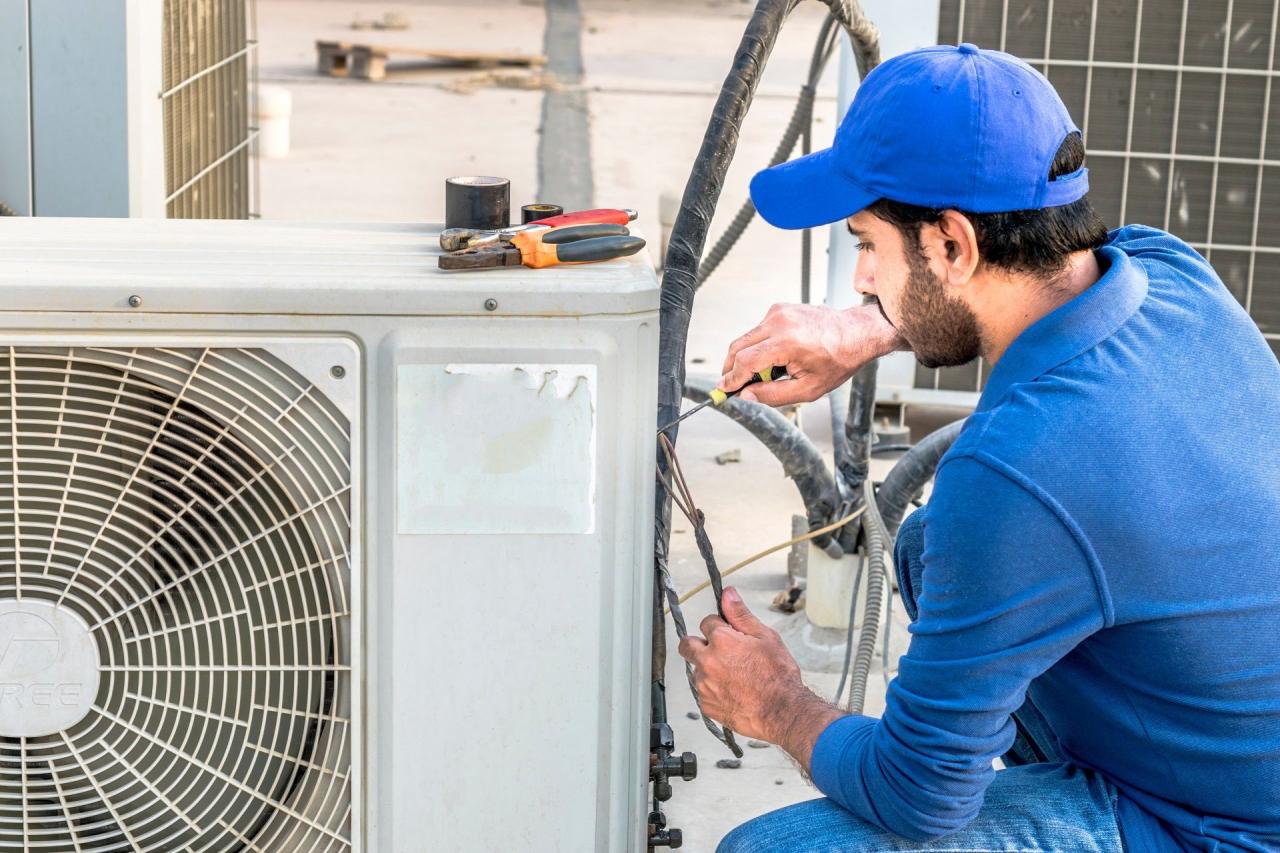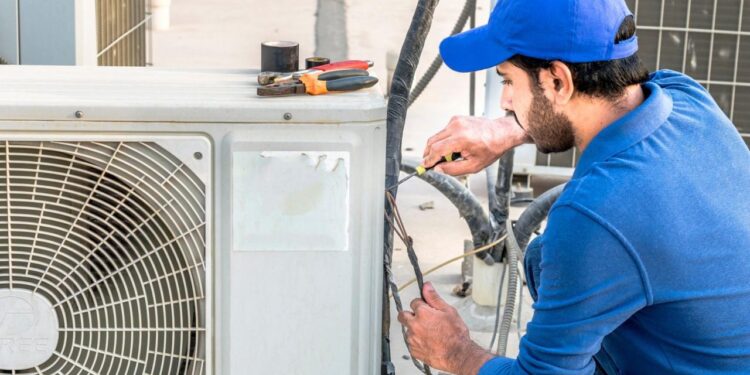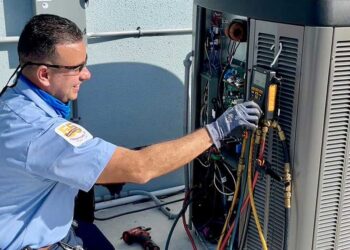Delve into the world of home air conditioning repair with this informative guide that covers everything from common issues to DIY troubleshooting tips. Whether you're facing a malfunctioning unit or simply want to extend the lifespan of your AC system, this article has got you covered.
Get ready to learn all about keeping your home cool and comfortable efficiently!

Common Issues with Home Air Conditioning Systems
Home air conditioning systems can encounter various problems that can disrupt their efficiency and performance. It is essential to be aware of these common issues to ensure timely maintenance and repair.
1. Refrigerant Leaks
Refrigerant leaks are a common issue that can result in insufficient cooling and increased energy consumption. Signs of a refrigerant leak include warm air blowing from the vents, ice buildup on the evaporator coils, and hissing sounds coming from the unit.
If you suspect a refrigerant leak, it is crucial to contact a professional repair service to locate and fix the leak.
2. Poor Airflow
Poor airflow can be caused by clogged air filters, blocked vents, or issues with the blower motor. Symptoms of poor airflow include uneven cooling throughout the house, weak airflow from the vents, and difficulty reaching the desired temperature. Regularly changing air filters and ensuring proper ventilation can help prevent airflow issues.
3. Electrical Problems
Electrical issues such as faulty wiring, capacitor problems, or a malfunctioning thermostat can lead to air conditioning system failures. Common signs of electrical problems include frequent tripping of the circuit breaker, the unit not turning on, or erratic cooling patterns.
It is essential to seek professional repair services for electrical issues to avoid further damage.
4. Strange Noises
Unusual noises such as grinding, squealing, or banging sounds coming from the air conditioning unit can indicate mechanical problems. These noises may be due to worn-out components, loose parts, or motor issues. Ignoring strange noises can lead to more significant damage, so it is advisable to have them inspected and repaired by a professional technician.
DIY Troubleshooting Tips for Home Air Conditioning Repair
When your home air conditioning system is not working properly, there are a few DIY troubleshooting tips you can try before calling a professional. These steps can help you identify common issues and potentially resolve them on your own.
Check for Clogged Filters
One of the most common issues with air conditioning systems is clogged filters. Dirty filters can restrict airflow and reduce the efficiency of your unit. Here's how you can check and clean your filters:
- Locate the air filter in your AC unit.
- Remove the filter and inspect it for dirt and debris.
- If the filter is dirty, clean it with a vacuum cleaner or replace it with a new one.
- Make sure to clean or replace the filter regularly to prevent future issues.
Inspect for Refrigerant Leaks
Another common problem in air conditioning systems is refrigerant leaks, which can cause your unit to blow warm air. Here's how you can check for and address refrigerant leaks:
- Inspect the refrigerant lines for any visible leaks or damage.
- If you suspect a leak, contact a professional to repair it, as handling refrigerant can be dangerous.
- Ensure your refrigerant levels are topped up to prevent future leaks.
Practice Safety Precautions
When performing DIY repairs on your air conditioning system, it's essential to take safety precautions to prevent accidents or injuries. Here are some safety tips to keep in mind:
- Always turn off the power to your AC unit before attempting any repairs.
- Use protective gear like gloves and goggles to avoid contact with sharp or hazardous components.
- If you're unsure about a repair or lack the necessary tools, contact a professional for assistance.
Importance of Regular Maintenance for Air Conditioning Systems
Regular maintenance of your home air conditioning system is crucial to ensure its efficiency, longevity, and overall performance. By investing in routine maintenance, you can prevent costly repairs, enhance energy efficiency, and improve indoor air quality.
Recommended Maintenance Schedule
- Change or clean air filters every 1-3 months to ensure proper airflow and reduce strain on the system.
- Inspect and clean evaporator and condenser coils annually to improve cooling efficiency.
- Check refrigerant levels and inspect for leaks every year to prevent system breakdowns.
- Inspect ductwork for leaks, cracks, or blockages every 2-3 years to maintain proper airflow.
- Schedule professional maintenance service at least once a year to ensure all components are working properly.
Tips for Maintaining Your AC System
- Keep the area around the outdoor unit clear of debris, vegetation, and other obstructions to allow for proper airflow.
- Ensure proper insulation around ductwork to prevent energy loss and maintain consistent cooling.
- Regularly check thermostat settings to ensure optimal temperature control and energy efficiency.
- Consider installing a programmable thermostat to regulate temperature settings based on your schedule.
- Listen for any unusual noises or odors coming from your AC unit and schedule a professional inspection if needed.
Hiring Professional HVAC Technicians for Air Conditioning Repairs
When it comes to air conditioning repairs, hiring a professional HVAC technician can offer several advantages over attempting to fix the system yourself. Not only do professional technicians have the necessary training and experience to diagnose and repair issues quickly and efficiently, but they also have access to specialized tools and equipment that may not be readily available to homeowners.
Additionally, professional technicians can provide valuable insights and recommendations to help prevent future problems and extend the lifespan of your air conditioning system.
Advantages of Hiring a Professional Technician
- Expertise: Professional technicians have the knowledge and skills to accurately diagnose and repair complex issues.
- Efficiency: Professionals can complete repairs in a timely manner, minimizing downtime for your air conditioning system.
- Quality Workmanship: Technicians are trained to deliver high-quality work that meets industry standards.
- Guarantees: Reputable HVAC repair companies often provide warranties on their work, giving you peace of mind.
What to Look for in a Reputable HVAC Repair Company
- Licenses and Certifications: Ensure that the company and its technicians are properly licensed and certified to perform HVAC repairs.
- Experience: Look for a company with a proven track record of successfully repairing air conditioning systems.
- References: Check online reviews and ask for references from past customers to gauge the company's reputation.
- Pricing: While cost is important, prioritize quality and expertise over the cheapest option.
Importance of Certifications and Experience
Certifications, such as NATE (North American Technician Excellence), demonstrate that a technician has met industry standards and possesses the necessary skills to perform air conditioning repairs effectively. Experience is also crucial, as seasoned technicians have likely encountered a wide range of issues and can quickly identify and resolve problems with your air conditioning system.
When choosing a technician, prioritize certifications and experience to ensure that your system is in good hands.
Final Conclusion
In conclusion, home air conditioning repair is essential for maintaining a comfortable living environment. By understanding the common issues, performing DIY troubleshooting, and scheduling regular maintenance, you can ensure your AC system functions optimally. Remember to seek professional help when needed and prioritize the longevity of your cooling system.
Stay cool and enjoy the benefits of a well-maintained air conditioning unit!
Common Queries
How often should I change the filters in my home air conditioning system?
It's recommended to change the filters every 1-3 months to ensure efficient operation.
Can I refill the refrigerant in my AC unit myself?
Refilling refrigerant should be done by a professional to prevent damage to the unit and ensure proper levels.
What are the signs that indicate my air conditioning system needs professional repair?
Signs include inadequate cooling, strange noises, or strange odors coming from the unit.
















